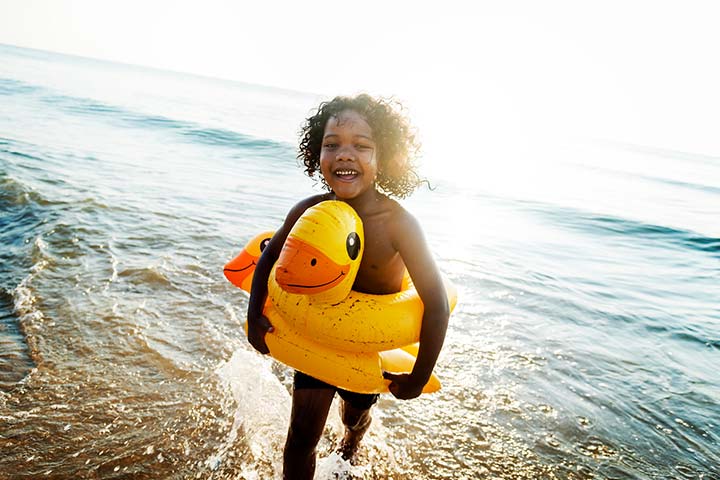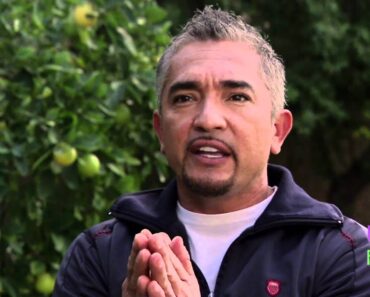Children get fascinated by water, and nothing can be more enjoyable for them than playing on the beach or by the pool or going on a picnic by the lake on a lazy summer afternoon. Besides, swimming offers a plethora of benefits for children.
However, water safety should be a priority to avoid mishaps during all this fun and enjoyment. Water safety isn’t limited to taking precautions in or around large water bodies. Even at home, children can drown in less than two inches (six centimeters) of water, such as in a sink, toilet bowl, bucket, and inflatable pool.
Why is water safety important, and how do you ensure water safety for kids? This post gives you the answers. Read on.
Importance Of Water Safety For Kids
Children love being in and around water bodies, and their natural inclination is to swim. You should encourage them to play in the water, but at the same time take all precautionary measures as water can be dangerous for them and drowning can happen in seconds.
The American Academy of Pediatrics reports that drowning is the leading cause of injury death in US children aged one to four years and the third leading cause of unintentional injury death among US children and adolescents aged five to 19 years.
Even when drowning does not cause death, in 5-10% of cases, it can result in severe brain damage and long-term disability, such as persistent vegetative state and quadriplegia (the loss of use of all four limbs and torso).
15 Water Safety Rules For Kids
Keeping children safe in the pool or other large water bodies isn’t the only concern when it comes to water safety. Water at home can also pose a hazard to children. Here are some water safety rules for kids to ensure your children’s safety in the water without limiting their fun.
1. Encourage buddy system
Encourage the buddy system during swimming as it reduces the risk of drowning. By swimming with a partner, your children will remain safer from drowning or any possible injury as they watch over each other. Also, ensure your child never swims alone, irrespective of the depth of water.
2. Teach children how to swim
Learning basic swimming lessons plays an essential role in water safety. The chance of drowning comes down when the children know how to swim. Young children can be taught basic water survival skills, such as learning to float on their backs. Enroll them in a swimming class or teach them yourself. Remember that supervision of young children in and around the water is still crucial even after they have learned to swim.
3. Keep the pools fenced
Children like being in and around the pool and indulging in a variety of activities. Therefore, swimming pools should be fenced and have latched gates as a preventative measure. It will reduce the risk of the child falling into the pool or accessing the pool alone. The fence should be at an appropriate height to prevent a child from climbing and should not block the view of the pool.
4. Wear personal flotation devices
Personal flotation devices, such as life jackets, vests, and coats, are available in different types. Adults should wear these whenever they are swimming and insist on their children to wear them. Children should be aware of the advantages and necessities of wearing life jackets when boating or fishing with you or their friends.
However, an inflatable swim aid or other buoyancy aid should not be considered a substitute for life vests—a life vest or jacket helps you stay afloat in the water by keeping your heads and mouths above the surface.
5. Follow the swimming area rules
Different swimming pools have different sets of rules and guidelines to ensure the safety of swimmers. The parents or guardians should ensure the children follow those rules. Swimming pool signs and symbols on the premises should be explained to children, and they should always obey the instructor’s instructions. Following the rules will ensure your child enjoys the fun water activities without accidents or injuries.
6. Learn CPR
The parents or caretakers of the child should learn cardiopulmonary resuscitation (CPR). CPR is a crucial life-saving procedure that helps keep blood and oxygen flowing through the body when the heart stops beating. Performing CPR within a few minutes after the heart has stopped beating can keep someone alive until a medical team arrives. Older children can also be taught how to perform the life-saving technique. To learn more about how to perform CPR, click here.
7. Keep to the designated area
Children need to be aware of the safety areas marked around the pool and not go beyond them. During your visit to a beach, lake, or water park, always encourage children to have fun in the designated area. Follow the rules and pay heed to the warnings posted near the water environment. Never allow your children beyond the restricted area, and always keep a watch on them.
8. Be aware of thin ice
Drowning cases occur in winter as well. Ask your child not to walk or skate on thin ice and always read the warning signs in the area. Also, if you are in a new location with lakes or rivers in winter, take the help of local guides to ensure your children’s safety.
9. Wear goggles while swimming
Children should wear water goggles to protect their eyes. Swimming without goggles can lead to eye irritation and infection. Chlorine is often added to swimming pools to disinfect the water. This chlorination affects the pH levels of water, which can cause irritation and redness to the eyes.
10. Keep swimming gears and related equipment handy
Taking your child out for fun in the water requires you to carry many essentials. Carry the following while taking your children to water parks or fun places with water.
- Cell phone: Make sure everyone carries a cell phone with them. It will come in handy in case of an emergency.
- Water safety devices: These include water safety devices such as buoys, life vests, and goggles.
- First aid: Ensure to carry first aid while you are with children.
11. Take a shower and apply barrier cream
Chlorine and chemical compounds used to disinfect the pool can be harsh on children’s skin, causing irritation, itching, and rashes. To ensure your child’s safety, always ask them to have a shower immediately after coming out from the pool. Also, apply skin barrier creams on your child’s soft body and keep them moisturized after swimming as the chemical in the water makes the skin dry.
12. Pay attention during bath time
Children can drown in just a few inches of water, so never leave them unattended during bath time. Ensure they keep their doors open when bathing and are also not distracted by toys or other items. Further, ensure to check the water temperature and water level in the bathtub.
13. Use childproof locks and knobs
Always keep the toilet lids closed when not in use and install child-safety locks to keep young children from toppling in. It also avoids contact with harmful bacteria. Make sure the taps are properly tied and install childproof knobs so the child can’t turn on the tap without your supervision. Further, ensure the bathroom door is closed or locked when not in use.
14. Drain the water from the bathtub or bucket
Always drain the bathtub or any water storage item when not in use. Water in bathtubs and buckets can attract young children, so the chance of falling in them is high. Buckets and wading pools should be drained after use and stored safely. You could also place anti-slippery strips or mats in the bathroom to avoid accidents due to a wet floor.
15. Install alarms and safety covers
Install a locked entry door to the pool area or an alarm that notifies you when someone enters the pool area. However, note that an alarm cannot replace appropriate fencing and supervision. A swimming pool should also be covered with a pool safety cover as a safety measure to protect your child.
Strictly enforce these water safety rules to protect your child from water accidents. Providing your child with water safety rules and guidelines will ensure their safety, but parent’s supervision and guidance still prevail. Keep in mind that water safety rules apply both when outdoors and at home.


































